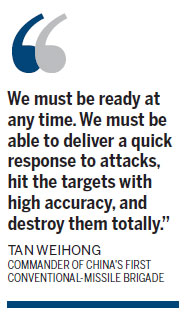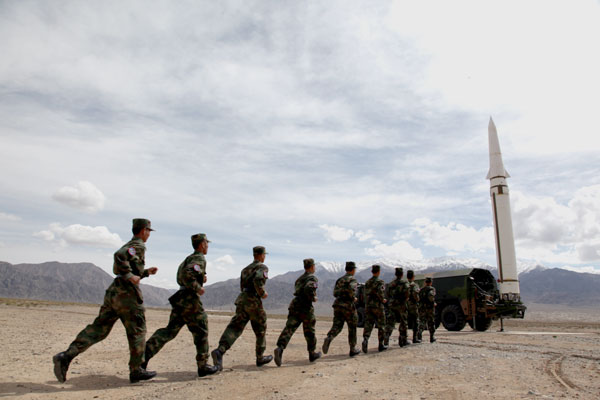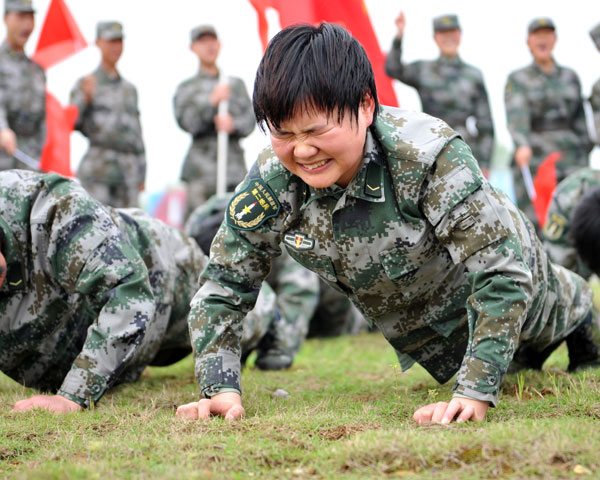
Editor's note: The Second Artillery Force, one of the four divisions of China's military, recently opened its doors to the country's English-language media.
China's missile division has always been the most mysterious part of the People's Liberation Army.
|
 |
Since the country's first conventional-missile brigade was established by the Central Military Commission in 1993, few civilians have ever had the chance to see the inner workings of this elite unit.
It first grabbed attention in July 1995, when China announced the PLA would carry out missile tests in the high seas. Six missiles were fired in a week and each successfully hit their target.
The following spring, the brigade fired four more missiles in another maneuver. Once again, all the missiles hit their targets.
The missions announced to the world that China had both nuclear and conventional missiles, and thereby a strengthened military deterrence system.
Before that, China had only nuclear missiles. The Gulf War in 1990 helped the nation's military leaders realize that conventional missiles were playing a bigger role in modern warfare.
The first conventional-missile brigade was formed under the Second Artillery Force, which controls both nuclear and conventional missiles. It is one of the four branches of the PLA, along with the army, the navy and the air force.
"Our brigade is known for its accuracy in missile launches," said Tan Weihong, the brigade's commander in an interview at its headquarters. "Of the 114 missiles it has launched so far, all have accurately hit the target."
|
 |
| Soldiers of the Second Artillery Force of the People's Liberation Army, China's missile division, participate in a drill at an unidentified location. Provided to China Daily |
|
 |
| A servicewoman of the Second Artillery Force tries her best in a physical fitness test. Provided to China Daily |
That record is a reflection of how hard the brigade is working to strengthen its combat abilities.
"Conventional missiles are a trump card in modern warfare," Tan said. "So we must be ready at any time. We must be able to deliver a quick response to attacks, hit the targets with high accuracy, and destroy them totally."
The brigade, which spends one-third of each year outside its base, goes to every corner of the country for training.
Missile-launching vehicles, larger and longer than trucks, painted with camouflage and equipped with super-large tires, have driven thousands of kilometers to places like the deep forests of South China and the windy plateaus of the nation's northwest.
Along the way, soldiers collect information on roads and bridges to build a database, which will be useful in future operations.
At the same time, data gathered at the training missions allow the brigade to determine how the equipment performs under various conditions. It helps improve missile operators' launch skills in all kinds of weather and geological conditions.
Besides hardships in training, the brigade's tradition of "being scientific and precise" and "to never stop pursuing perfection" is also a reason for its 100-percent success rate, said Major Deng Huihui, a 29-year-old staff officer.
Deng recalled that a few years ago, he took part in a drill in Northwest China. In the field, the missile launch vehicle was parked on uneven terrain. Missile operators had to consider the best way to arrange the cables. Otherwise a single launch could destroy the cables and abort further drills.
Believing he was one of the best missile operators in the brigade, Deng had full confidence in the way he arranged the cables.
"But the brigade's then-chief of staff gave me 13 pieces of advice. I was shocked, but from him I learned the importance of pursuing perfection. This is the 'secret' of our brigade," he said.
Zhang Jichun, the brigade's commissar, agreed: "In the last 19 years, our soldiers changed, and our weapons are more advanced, but the tradition remains."
In the past years, the brigade's armament has been updated several times. Each time, the soldiers learn how to use the equipment in the shortest period of time.
Meanwhile, with the increase of missile launching units over the years, the brigade had to develop a new commanding system to replace the old one that was based on vocal orders.
"The new system can handle multiple launches at the same time, which was impossible in the past," Tan said.
Brigade leaders now also give more thought to the human factor.
"The soldiers' psychological health is something I consider now, but didn't in the past," Tan said.
Enlisted soldiers nowadays were mostly born in the 1990s, with some born in the 1980s, said Major Zhang Zhibin, a political instructor of the brigade's fourth battalion.
Most of the young soldiers he meets are the only child of a family, some from single-parent families and some that used to live with grandparents.
"They grew up comfortably. Many don't know how to take care of themselves. They like to spend time alone instead of communicating with others," he said.
They also grew up with computer games, the Internet and instant messengers such as QQ. Zhang Yichao, the brigade's chief of staff, said a few even had an addiction to the Internet before joining the army.
In recent years, the brigade has been doing its best to meet the young soldiers' needs.
In its recently revamped camp, which has a small artificial pond at the center, soldiers are accommodated in new four-story buildings. There's a flat-screen TV in each room and each soldier is given a laptop for daily use.
"Every soldier having a computer is something uncommon in the PLA," said Zhang Yichao.
And even though soldiers can't get on the Internet in their dorm, they can log on to the intranet designed by the brigade.
On the intranet, soldiers can get news, but also computer games and popular TV series for relaxation.
The brigade also opened an Internet cafe that soldiers can use on weekends.
The measures were warmly received by the young soldiers.
"Having a whole Sunday playing my favorite computer games really helped to release pressure after a week's hard training and living with strict discipline," said Yuan Xiaojian, a soldier in his second year with the brigade.
Yuan, who graduated from Zhengzhou University with a bachelor's degree in water conservancy, said the laptop is also helpful because he is teaching himself a computer language.
With their needs met, the brigade also tried to train the young soldiers to become tougher.
Zhang Jichun, the brigade's commissar, said it is wrong for some people to believe that as long as the missiles are advanced, soldiers in missile troops can rely on the weapon and do not need to train their minds or bodies.
The brigade organizes regular physical training exercises to challenge the youngsters.
First, they complete a 5,000-meter run. Then, two soldiers carry logs weighing 60 to 80 kilograms and walk through a ditch of waist-high water. Finally, every soldier carries a 30-kg sandbag and walks through the ditch again.
"I have to launch missiles on a plateau with snow, in deep forests, in deserts. I'm in my 30s, and the training keeps me in the best condition," said Zuo Xiaoshan, a senior sergeant at the brigade.
In a drill in October, soldiers finished their exercises after eating only one meal in 16 hours. Nobody failed the mission, he said.
And because a missile launch is a team effort, soldiers are trained to cooperate and to trust each other.
Special training includes having a soldier fall from a 10-meter platform, trusting his fellow soldiers will get him before he hits the ground.
"If the missiles are a sword, then our soldiers are the sword's hilt. Only when the two work together perfectly can the sword become invincible," Zhang Jichun said.







